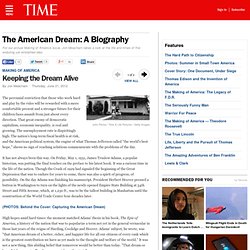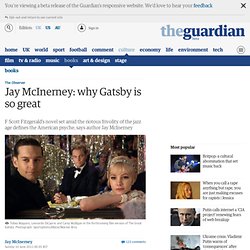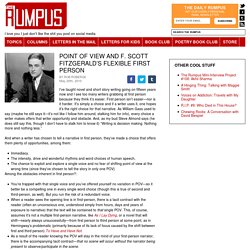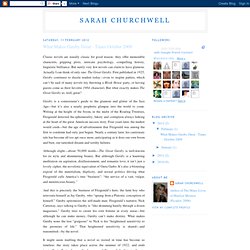

The Great Gatsby Quotes, Important Great Gatsby Quotes, Great Gatsby Sayings Quotations. Keeping the Dream Alive - The American Dream: A Biography. The perennial conviction that those who work hard and play by the rules will be rewarded with a more comfortable present and a stronger future for their children faces assault from just about every direction.

That great enemy of democratic capitalism, economic inequality, is real and growing. The unemployment rate is dispiritingly high. The nation's long-term fiscal health is at risk, and the American political system, the engine of what Thomas Jefferson called "the world's best hope," shows no sign of reaching solutions commensurate with the problems of the day. It has not always been this way. On Friday, May 1, 1931, James Truslow Adams, a popular historian, was putting the final touches on the preface to his latest book. High hopes amid hard times: the moment matched Adams' thesis in his book, The Epic of America, a history of the nation that was to popularize a term not yet in the general vernacular in those last years of the reigns of Harding, Coolidge and Hoover.
Was Gatsby Great? The Great Gatsby Part 2: Crash Course English Literature #5. Like Pale Gold - The Great Gatsby Part I: Crash Course English Literature #4. Great-gatsby-the-times.pdf. Jay McInerney: why Gatsby is so great. The Great Gatsby seems to be enjoying a moment, what with the success of the New York production of Gatz, opening in London (described by America's leading theatre critic Ben Brantley as "The most remarkable achievement in theatre not only of this year but also of this decade"), and the release later this year of Baz Luhrman's $120m film version.

The book was little noticed on your side of the Atlantic on its initial publication. Collins, which had published the English editions of F Scott Fitzgerald's first two novels, rejected it outright, and the Chatto and Windus edition failed to arouse much enthusiasm, critical or commercial, when it was published in London in 1926. To be fair, the novel hadn't been a smash hit in the States the year before, selling less than his two previous novels and falling well short of the expectations of Fitzgerald and his publisher, despite some very good reviews. At that time, Gatsby seemed like the relic of an age most wanted to forget. Point Of View And F. Scott Fitzgerald’s Flexible First-Person. I’ve taught novel and short story writing going on fifteen years now and I see too many writers grabbing at first person because they think it’s easier.

First person isn’t easier—nor is it harder. It’s simply a choice and if a writer uses it, one hopes it’s the right choice for that narrative. As William Gass used to say (maybe he still says it—it’s not like I follow him around, stalking him for info), every choice a writer makes offers that writer opportunity and obstacle. And, as my bud Steve Almond says (he does still say this, though I don’t have to stalk him to know it) “Writing is decision making.
Nothing more and nothing less.” And when a writer has chosen to tell a narrative in first person, they’ve made a choice that offers them plenty of opportunities, among them: Gatsby_critical_insights. Narrative perspective. Sarah Churchwell: What Makes Gatsby Great - Times October 2009. Classic novels are usually classic for good reason: they offer memorable characters, gripping plots, intricate psychology, compelling history, linguistic brilliance.

But surely very few novels can claim to have glamour. Actually I can think of only one: The Great Gatsby. First published in 1925, Gatsby continues to dazzle readers today—even to inspire parties, which can’t be said of many novels (try throwing a Bleak House party, or having guests come as their favorite 1984 character). But what exactly makes The Great Gatsby so, well, great? Gatsby is a connoisseur’s guide to the glamour and glitter of the Jazz Age—but it’s also a nearly prophetic glimpse into the world to come. Although slight—about 50,000 words—The Great Gatsby is well-known for its style and shimmering beauty. And this is precisely the business of Fitzgerald’s hero, the farm boy who reinvents himself as Jay Gatsby, who “sprang from a Platonic conception of himself.” All of which Fitzgerald understood. Life of Gatsby Video SparkNote. The Great Gatsby by F. Scott Fitzgerald CliffsNotes - Study Guide and Help.
The Great Gatsby.